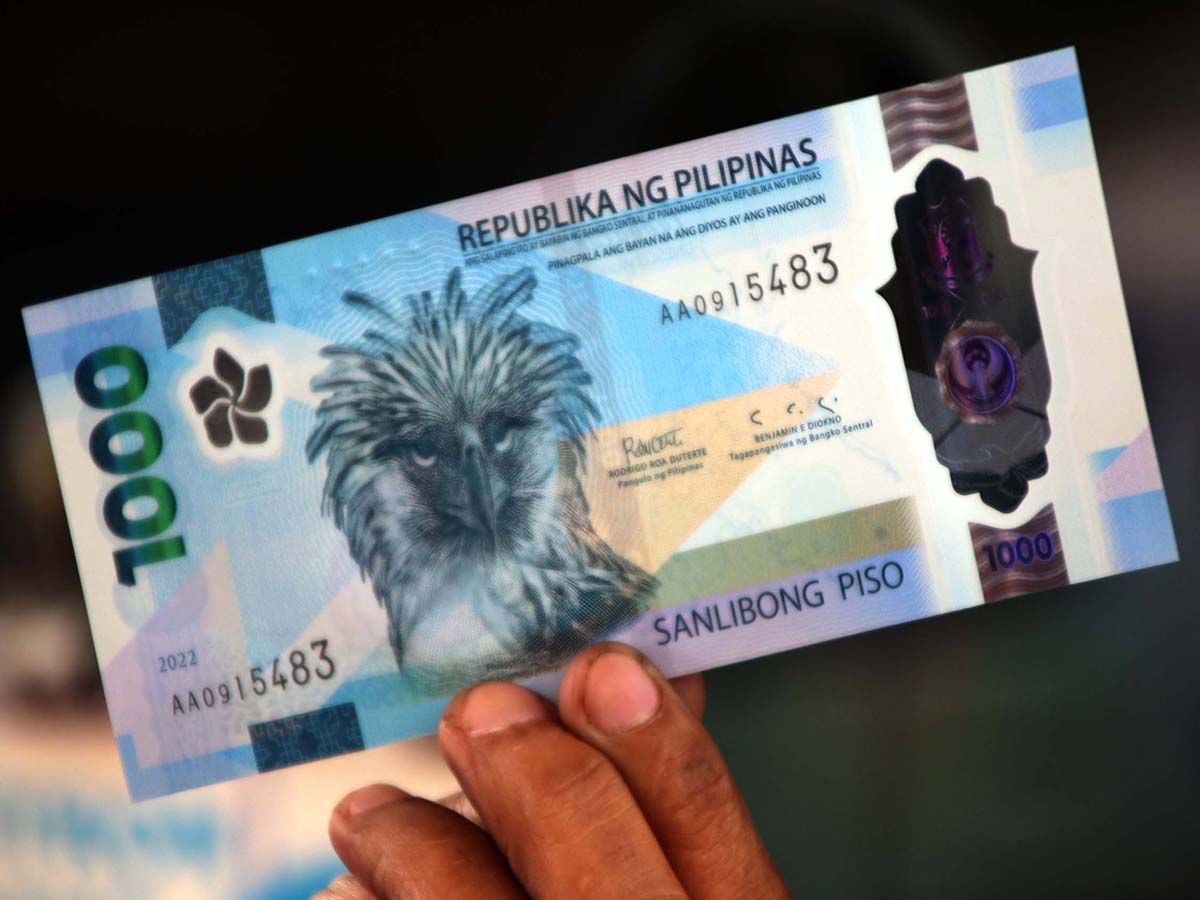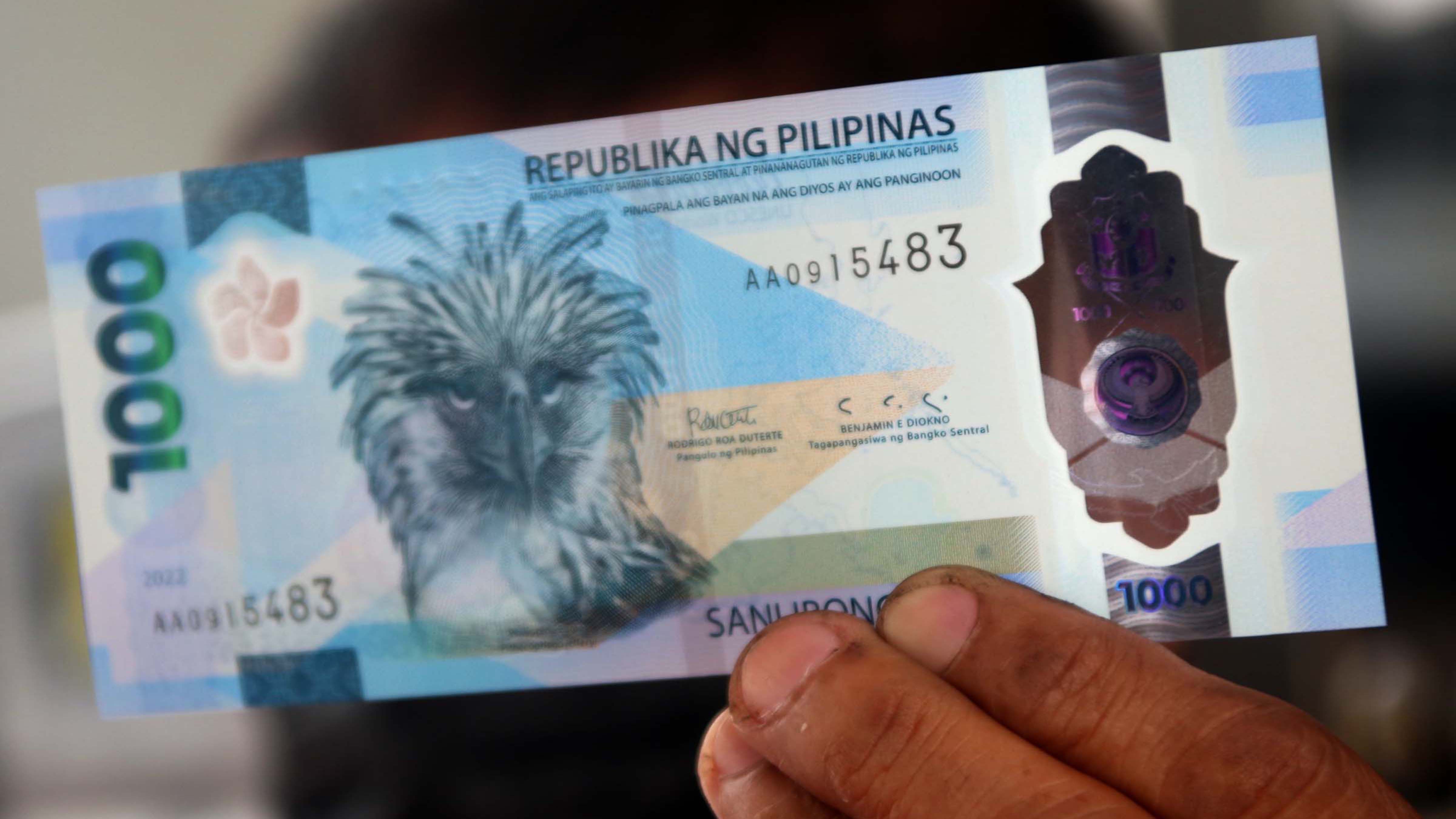At a time when the country is poised to reduce plastic usage to make good on its commitment to climate change adaptation measures, the Bangko Sentral just issued in April P1,000 plastic banknotes that would be difficult for ordinary citizens to handle.
When the Bangko Sentral ng Pilipinas started launching in April this year the polymer banknotes worth P1,000, this drew much criticism from social media with netizens asking why the shift to plastic—which would kill the local abaca industry (fiber being an important ingredient to the old paper notes).
But even before that people did not like the idea of removing the heroes from the paper notes and replacing them with birds and other icons, which are not historically relevant and therefore not educational for the people (especially the young).
Still the BSP continued circulating the controversial bank notes (both paper and polymer) despite objections from the public.
A shopper who was paying his bill with a folded polymer P1,000 note in a mall got shocked when the mall refused to accept his new money. So, he took to social media to vent his disgust recently.
Unlike the country’s existing paper banknotes—which are made of paper substrate with 20 percent abaca and 80 percent cotton blend—the P1,000 banknote released this April is made of polymer.

THE CONTROVERTIAL BANKNOTE. An attendant at a gas station in Tomas Morato, Quezon city shows a P1,000 polymer bill today amid a controversial guidelines of do's and don'ts by the Bangko Sentral which was retracted today. The BSP previously did not allow folded polymer bills for transactions only to rescind this order today as it said it can be accpeted as payments after a social media frenzy attacking and ridiculing such an order. DANNY QUERUBIN
“It is no longer paper, it is plastic,” said Bangko Sentral ng Pilipinas (BSP) Deputy Governor Mamerto Tangonan told Inquirer, which ran a story on the proper handling of polymer bills like keeping them: 1) flat with a long wallet (something which ordinary Filipinos do not carry); 2) clean (with a damp cloth) and 3) using them as payment for goods and services.
Polymer banknotes are tough, according to the BSP, and it can last longer than paper banknotes. However, the P1,000 polymer banknote requires better care so it can last much longer.
Like paper banknotes, people must not: a) deface (write on or mark the new bills); b) excessively fold, crease or crumple banknotes which would leave permanent marks; c) tear, cut or poke holes in it; d) staple or use rubber bands to keep them together but use paper bands; e) damage the clear windows, metallic features and other security features; f) iron polymer banknote; g) expose them to very high temperatures or place them near an open flame and h) expose them to strong or corrosive chemicals like muriatic acid or bleach.
Presidential Decree No. 247 says it is unlawful for any person to willfully deface, mutilate, tear, burn or destroy, in any manner whatsoever, currency notes and coins issued by the BSP (still Central Bank of the Philippines when the decree was issued).
“[A]ny person who shall violate this decree shall, upon conviction, be punished by a fine of P20,000 or less and/or by imprisonment of not more than five years,” the PD added.
However, according to BSP Mindanao Regional Office bank officer Dorothy Joy Diaz, it is okay if the banknote got damaged unintentionally. “If it is not intended, that is fine, but if done willfully, as you did it out of curiosity, that is punishable,” Diaz told Inquirer.
The BSP encourages the public to report any information on improper handling of Philippine currency to the nearest police station or law enforcement agency, for appropriate action, or contact the Currency Management Sector for assistance at the following telephone numbers: 988-4833 and 926-5092.
Medalla says to have a wallet or purses
BSP governor Felipe Medalla said in a report: “One thing to adjust is to have wallet or purses that prevent it from being totally folded. The wallet should at least be the same length as the banknote so that it can’t fold.”
Not all Filipinos carry wallets or purses, especially among commuters who are wary of being snatched or their bags slashed. Most keep their moneys in front pockets of their clothes or anywhere they feel safe.
The BSP recommended applying pressure or flattening the banknote using hands. It can also be placed in between the pages of a book to straighten it out or flatten the crumpled or creased areas.
However, it is a different case if the polymer banknote gets totally folded or excessively creased or crumpled.
Unfit banknotes
When the polymer banknotes—as well as paper banknotes—get excessively folded, crumpled, and creased, they could have visible and permanent fold marks.
According to BSP, banknotes with heavy creases, which “break its fiber and indicate that disintegration has begun, are considered “unfit.”
The BSP emphasized, however, that “banknotes with fold marks may still be recirculated and used as payment for goods and services.”
Based on BSP’s Philippine Currency Fitness Guide, there are several visual fitness criteria of banknotes that are considered unfit for recirculation.
The BSP explained what a mutilated banknote is:1)Any obvious or visible break, hole, or loss of any part of the banknote; 2) Presence of adhesives—tape, stickers, glue, gum, or staple wire—or any material not originally on the banknote; 3) Separation of the front and back sides of the banknote; and 4) Damages due to fire burn, water, or chemical.
But it said unfit banknotes and coins shall be exchanged or deposited with any bank.
“Mutilated currency must be placed in appropriate containers to avoid disintegration or further deterioration while in transit,” said the BSP.
Salceda asks BSP to explain
House Ways and Means Committee chair Joey Sarte Salceda on Monday asked BSP to clarify the acceptance of damaged, folded or otherwise altered P1,000 polymer bills by business establishments, in response to concerns raised by both businesses and consumers, in a letter to Medalla.
“I understand that one of the primary motivations for shifting to the polymer-based bill was that it is more durable than the paper bills,” the lawmaker said in his letter. “However, the lack of guidelines on what constitutes still-valid legal tender and which bills are damaged beyond being acceptable by business establishments has led to confusion in ordinary cash transactions.”
According to Congressional rules, Salceda’s committee oversees “monetary and financial affairs of the national government.”
“As such, to resolve these concerns, may I request that the BSP issue guidelines on accepting polymer P1,000 bills, and what remedial recourses cash-holders can resort to, should their polymer bills no longer be acceptable to establishments. I understand that, with the paper bills at least, damaged bills could still be exchanged with banks and the BSP,” Salceda said.
In theory and in usual practice, Salceda, who once worked at UBS Warburg (a division of Swiss Bank Corp.), the value of money is not affected by its appearance.
“What matters is the validity of the promise embedded in the currency. That should determine the value. Money is fungible, so you should be able to exchange one bill with another and not lose value. One folded bill should be just as good as a bill not folded,” he said.
If the polymer bills are more sensitive and less flexible than the paper bills, he said the whole effort sort of defeats its own purpose, which is to make paper bills more durable.
“I also have problems with enforcing the prohibitions against folding the bill. How do you tell who did what? There isn’t a record of who held which bills,” he added.
“Anyway, I hope Philip [Medalla] directs the issuance of guidelines soon. We are not the only currency using polymer. Australia and Canada also do; and they’re not quite as finicky about the bills,” Salceda said.
Salceda also said he has scheduled a meeting with the BSP officials on the polymerization of other bills as well as their impact on the abaca sector. Abaca is used in some paper bills issued by the BSP.
Tags: #BSP, #P1,000banknotes, #polymervspapernotes, #dosanddonts, #money

